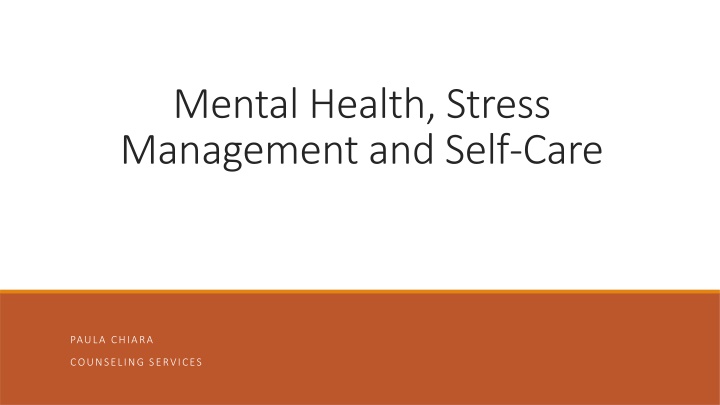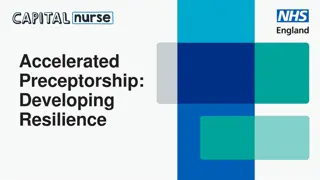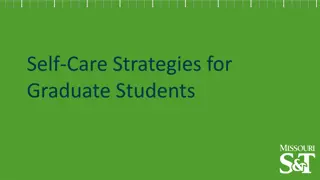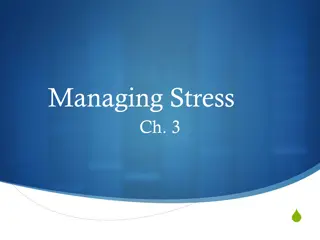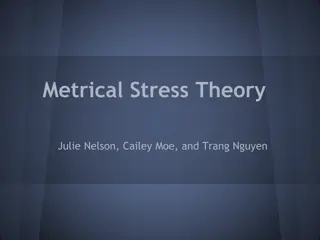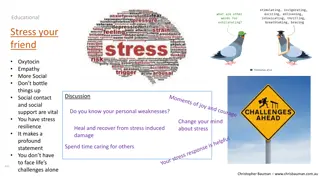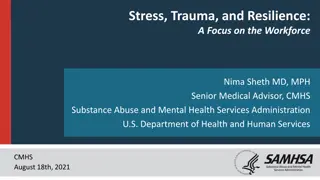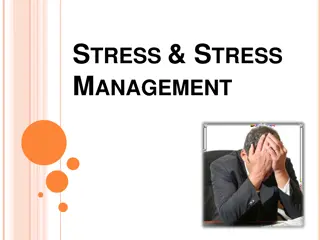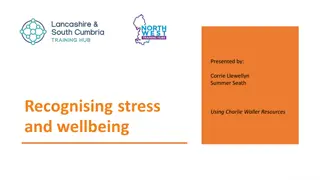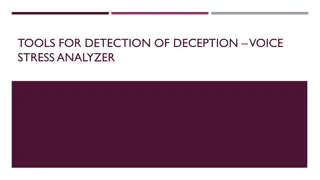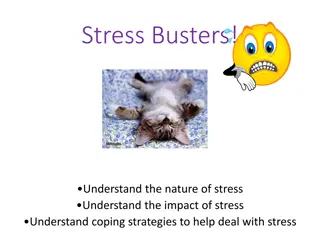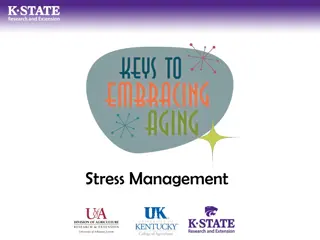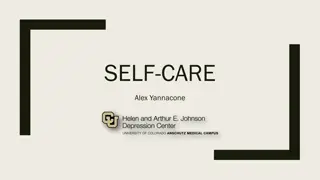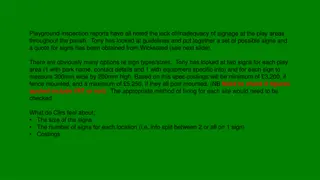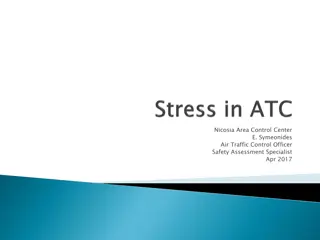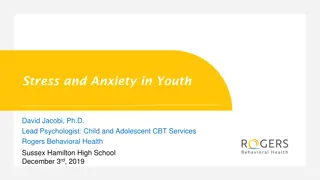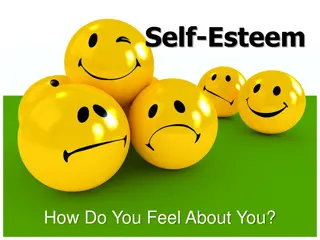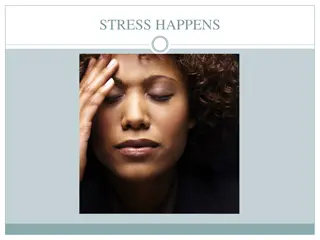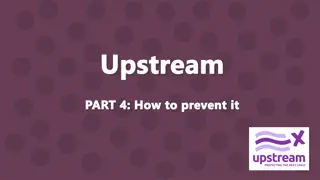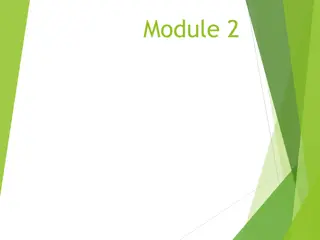Recognizing Signs of Stress and Importance of Self-Care
This content delves into identifying signs of excessive stress such as changes in appetite and sleep, and emphasizes the significance of self-care for physical, emotional, mental, and spiritual well-being. It discusses the acceptance of human emotions and exercise of self-compassion in challenging times.
Download Presentation

Please find below an Image/Link to download the presentation.
The content on the website is provided AS IS for your information and personal use only. It may not be sold, licensed, or shared on other websites without obtaining consent from the author.If you encounter any issues during the download, it is possible that the publisher has removed the file from their server.
You are allowed to download the files provided on this website for personal or commercial use, subject to the condition that they are used lawfully. All files are the property of their respective owners.
The content on the website is provided AS IS for your information and personal use only. It may not be sold, licensed, or shared on other websites without obtaining consent from the author.
E N D
Presentation Transcript
Mental Health, Stress Management and Self-Care PAULA CHIARA COUNSELING SERVICES
How do you know when you are experiencing too much stress?
Signs of distress Changes in appetite, energy, and activity levels. Difficulty sleeping or nightmares and upsetting thoughts and images. Difficulty concentrating Feelings of numbness, disbelief, anxiety or fear. Increased isolation and avoidance Shift in performance. Changes in personal appearance or lifestyle Physical reactions, such as headaches, body pains, stomach problems, and skin rashes. Worsening of chronic health problems. Irritability, anger or short- temper. Increased use of alcohol, tobacco, or other drugs.
Stress No all Stress is bad in itself : growth and resiliency Lack of recovery is the problem Plan for small and big breaks to recover from stress Simplify. Do less (if possible. Acknowledging cultural-socio-economic context) Challenge cultural messages Burnout as a badge of honor Brene Brown (Gift of imperfection)
SELF SELF- -CARE CARE What is self-care for you? How much time do you spend in self-care? What things do you do to take care of yourself? What things have helped you in difficult times?
Self-care TAKING CARE OF OUR: PHYSICAL HEALTH EMOTIONAL HEALTH MENTAL HEALTH SPIRITUAL HEALTH
Acceptance Importance of accepting (rather than suppressing) all human emotions. Part of being human is to experience uncomfortable emotions Suppression intensifies emotion Acceptance reduces intensity of painful emotion (works well for anxiety) Do we give ourselves and others permission to be fully human?
Exercise self Exercise self- -compassion compassion It s ok to be less motivated, to have difficult days, to be less organized or productive, to be frustrated. Once you acknowledge the feeling you can take steps to move forward. Treat yourself as you would treat a friend who is going through a difficult time: caring and loving way. Give yourself credit for every small progress. A moment of self-compassion can change your entire day. A string of such moments can change the course of your life. Christopher Germer.
Mind Body connection Exercise is central to our wellbeing We were created to move Endorphins, dopamine, serotonin, feel good chemicals that lift up your mood Improve motivation, energy level, ability to concentrate.
Mindfulness Mindfulness Mindfulness is basically becoming aware of what you are thinking or feeling in the present moment. Turning off the autopilot and taking a more intentional charge of our lives. Being in the moment vs multitasking. https://www.youtube.com/watch?v=w6T02g5hnT4
Benefits Benefits Greater awareness and understanding of ourselves Decreased anxiety and depression Less emotional reactivity Stress reduction Improved concentration Increased energy and creativity
Different ways to practice mindfulness Different ways to practice mindfulness Yoga, stretching, prayer (Focus on one thing at a time for example your breathing, a mantra or intension, a visual image, prayer). Progressive muscle relaxation Going for a walk and paying attention to the senses. Listen to the sounds of nature Music: Calming music has a beneficial effect on our minds and bodies: slows downheart rate, lowers blood pressure, decreases the levels of stress hormones. Music has a unique link to our emotions and helps lift up our mood. Journaling Painting (Grounding helps to regulate emotion) https://www.youtube.com/watch?v=tEmt1Znux58 https://www.youtube.com/watch?v=77ZozI0rw7w Jerusalema Dance Challenge - Best Performances around the world ! - YouTube
How can slowing down and focusing attention on myself with curiosity and compassion help when I am already running out of time? Evidence in the field of neuroscience points to brain changes associated with mindfulness practice in which we tend to approach, rather than withdraw from challenges. In other words, it helps us build resilience. Other benefits with regular practice include increased attention span, decreased risks of recurring depression, improved immune functioning, and overall sense of well being and gratitude.
Emotions and thoughts are like clouds they come and go, but you are the sky. Courage is not the absence of fear, courage is fear walking. Susan David Emotional Agility
Identify thoughts and feelings Acknowledge and silently observe whatever goes inside you (curious scientist). It s helpful to put your experience into words: I m noticing anxiety My mind is worrying or I m feeling sad or I m having thoughts about getting sick . Mindfulness allows you to notice your uncomfortable feelings without getting stuck on them. Journal if you like writing. Pay attention to the impact of your thoughts on your emotions Every emotions is valid. Try not to judge yourself. Unconditional acceptance or permission to be human (We accept the emotion and chose how to behave, respond).
Other healthy coping Distractions and hobbies? Do more of what works for you.
Importance of connection Importance of connection Relationships and social support are best predictor of happiness and resiliency. Do we make time to connect with others and enjoy life? Remember you are not alone. Call someone you trust and share your feelings. Vulnerability is hard but it helps develop deeper connections (Brene Brown)
Limit news/social media Limit news/social media Identify the amount of information you need without feeling overwhelmed.
Positive Psychology Interventions Positive Psychology Interventions Gratitude: appreciating the good and ordinary in our lives (without ignoring minimizing the pain) Today I am grateful for . The little things? The little moments? -They aren t little.
Anything thats human is mentionable, and anything that is mentionable can be more manageable. When we can talk about our feelings and reactions, they become less overwhelming, less upsetting, and less scary. The people we trust with that important talk can help us know that we are not alone. Fred Rogers
One thing I want to try One thing I want to try What can I do, starting now, to take care of my mental, emotional or physical health ?
Additional resources Additional resources Visit UWEC counseling Services home web page for more resources on mental health Happiness 101 with Tal Ben Shahar https://www.youtube.com/watch?v=OxsPl2WClHg Susan Davis: Ted Talk : The gift and power of emotional courage https://www.ted.com/talks/susan_david_the_gift_and_power_of_emotional_courage?language =en Brene Brown: Power of Vulnerability https://www.ted.com/talks/brene_brown_the_power_of_vulnerability/c
